OKXE Secures $14.5M to Advance Vietnam’s Used Motorbike Market and Enter EV Race
Vietnamese used motorcycle trading platform OKXE has successfully closed a $14.5 million Series A funding round, marking a significant step in its growth journey. The round was led by South Korea’s Kwangju Bank, with continued support from existing backers JB Financial Group and The Invention Lab. This is OKXE’s second major funding milestone after raising $5.5 million in 2020 from VC Partners Investment and other Korean institutional investors. With this latest capital injection, the company plans to expand its directly managed stores in Ho Chi Minh City and Hanoi, roll out AI-powered maintenance services, and integrate financial and insurance products into its platform.

As of 2024, OKXE recorded over 8.2 million app downloads, 1.57 million active users, and partnerships with more than 2,130 motorcycle dealer shops. The total listing value on the platform has also surpassed 3.5 trillion VND (around $137.8 million USD). In a strategic move to future-proof its offerings, OKXE entered the electric motorcycle market in late 2024 through a partnership with VinFast, the EV arm of Vietnamese conglomerate Vingroup, setting the stage for more sustainable mobility solutions.
This Series A funding reflects growing investor confidence in Vietnam’s mobility and e-commerce potential. With a blend of strong performance metrics, Korean backing, and expansion into AI, finance, and electric vehicles, OKXE is emerging as a serious player in the two-wheeler market across Southeast Asia. Its collaboration with VinFast not only taps into Vietnam’s green transport momentum but also highlights the company’s long-term commitment to evolving with future mobility trends.
Tasco Joins Vietnam’s Startup Race with New Corporate Venture Arm
Vietnamese construction and infrastructure giant Tasco JSC is preparing to launch a corporate venture capital (CVC) arm to diversify its investments and tap into emerging startup opportunities. While the fund size has not yet been disclosed, Tasco’s CVC strategy will focus on areas that align with its core strengths: smart transportation infrastructure, sustainable urban development, construction tech, digital solutions, and green infrastructure. These sectors are becoming increasingly important as Vietnam rapidly urbanizes and seeks more sustainable and tech-driven solutions.

Tasco’s move comes amid a growing wave of Vietnamese corporates entering the venture investing space. It follows the footsteps of major players like Vingroup (VinVentures), NextTech (Next100 Ventures), and Teko (Teko Ventures), while others like VNG and Sovico are also actively pursuing startup investments. In Q1 2025 alone, Vietnamese startups raised $167 million across 11 deals, with late-stage investments gaining strong momentum, indicating a more mature, competitive startup ecosystem.
Tasco’s entry into venture capital marks a strategic shift for traditional corporates seeking to stay relevant in the innovation economy. By leveraging its deep expertise in infrastructure and mobility, Tasco is well-positioned to support startups that align with its business priorities. This not only strengthens Vietnam’s growing investment landscape but also signals a broader evolution where corporate capital and entrepreneurial innovation increasingly intersect.
Prime Minister Calls for Nationwide Effort to Build Startup Nation
Prime Minister Pham Minh Chinh has called for a nationwide push to turn Vietnam into a “startup nation,” highlighting entrepreneurship, innovation, and digital transformation as critical drivers of the country’s future. The message was delivered during a government meeting on July 22, 2025, where key topics like build-transfer (BT) contracts, global corporate tax rules, and a national startup development strategy were also on the agenda. The initiative outlines a state-led effort to not only build a more robust startup ecosystem but to align it with national economic policy and governance.

Prime Minister Phạm Minh Chính. | Source: VGP/Nhat Bac for the Online Newspaper of the Government
The Prime Minister emphasized several core priorities, including strengthening legal and institutional frameworks, investing in human capital, and nurturing innovation ecosystems. He also underscored the importance of public awareness, regular evaluations of best practices, and strong communication efforts to scale successful models. These pillars suggest a holistic, long-term approach - one that focuses not just on launching more startups, but on creating an environment where they can thrive sustainably and contribute meaningfully to national growth.
This top-down push signals Vietnam’s growing ambition to move up the global innovation ladder. By aligning policy, capital, and talent development, the government is laying the groundwork for a more dynamic, resilient startup economy. For founders and investors alike, this effort offers a clearer roadmap and stronger policy support - critical ingredients in turning Vietnam into one of Southeast Asia’s most promising innovation hubs.
Vietnam Greenlights IP as Startup Capital in Major Legal Reform
Vietnam has taken a major step to modernize its startup and investment landscape with the introduction of Decree 210/2025/NĐ-CP, which will take effect on September 15, 2025. This new legal framework allows startup investment funds to receive capital contributions not only in cash or land use rights but also in the form of intellectual property (IP), technology, and technical know-how. By officially recognizing intangible assets as valid capital, the decree opens the door for more innovative and IP-rich startups to attract investment without relying solely on traditional financial resources.

Alongside the reform, new operational guidelines for investment funds are also being introduced. These include clearer rules for how funds can invest, such as equity and convertible instruments, with safeguards like a 50% cap on a startup’s post-investment charter capital. The updated framework also defines how funds should manage idle capital, maintain separation from fund managers’ assets, and follow proper procedures for dissolution, including online filing and mandatory reporting. Importantly, funds registered before the new law takes effect will be partially exempt, but pending approvals must comply with the updated rules.
This reform represents a meaningful upgrade for Vietnam’s venture capital environment. By legitimizing IP as a form of capital contribution and tightening fund governance, the government is signaling stronger support for innovation-driven growth. It provides more legal certainty for both investors and startups, helping build trust and scale the ecosystem.
Bank Supporting Startups: A Golden Opportunity
Vietnam’s banking sector is undergoing a notable shift as more commercial banks begin opening up to startups. By mid-2025, credit growth had reached 9.9%, with a growing share directed toward early-stage companies in priority sectors like manufacturing and technology. A standout example is M Village, a hospitality startup that secured a significant loan from OCB, signaling a move away from total dependence on venture capital and toward a more diversified funding approach. Founders are increasingly drawn to bank loans due to lower interest rates, typically around 10%, compared to the 30%+ internal rate of return (IRR) expected by venture capital firms.

This shift is also redefining how banks assess lending. Institutions like OCB are moving beyond traditional collateral requirements, instead evaluating business model viability, founder capability, and cash flow stability. Partnerships between banks and venture capital firms, such as Genesia Ventures, are making it easier for startups to access non-collateral working capital. Additionally, the State Bank of Vietnam is encouraging commercial banks to support credit for SMEs and startups, particularly in green growth and digitalization. Foreign partners like Japan’s Aozora Bank are reinforcing this momentum by supporting cash flow-based lending initiatives.
This evolution reflects a maturing startup ecosystem where banks play a bigger role in funding innovation. With calls for dedicated lending frameworks tailored to each stage of a startup’s growth, Vietnam is laying the foundation for a more inclusive and stable financial environment.
Vietnam Sets Bold Course for Stock Market Upgrade by 2030
Vietnam is setting its sights on becoming a regional financial hub by 2030, with a bold plan to transform its stock market into a key driver of economic growth. The government’s strategy is anchored in three pillars: modern infrastructure, tech-led growth, and capital market reform. One of the major milestones ahead is the country’s anticipated upgrade to “Emerging Market” status by FTSE Russell in September 2025, a move that could unlock access to deeper pools of global capital. To support this transition, authorities are ramping up regulatory reforms and planning major IPOs between 2026 and 2027 to boost liquidity and investor confidence.

At the same time, Vietnam is shifting its growth strategy away from heavy reliance on foreign direct investment and low-cost labor. Instead, it’s focusing on strengthening domestic industries and promoting public market participation, particularly from the private sector. While the current stock market capitalization sits at just 50-55% of GDP, well below the 2030 target of 120%, analysts like Đặng Nguyệt Minh from Dragon Capital believe the market remains undervalued and under-participated. Addressing gaps in investor diversity and corporate governance will be key to attracting both global institutional players and more long-term local investors.
Vietnam’s roadmap to 2030 signals a pivotal moment in its financial development. The ambition is high, but the approach is grounded in structural reform and strategic intent. For young investors and professionals, this transformation presents new opportunities, not just in the stock market itself, but across sectors tied to tech, finance, and infrastructure. If executed well, Vietnam could emerge as one of Southeast Asia’s most dynamic investment destinations.
Genesia Ventures is an early-stage venture capital firm operating in Japan and Southeast Asia, with a strong belief in the long-term potential of Vietnam’s digital economy. Beyond providing capital, the fund actively supports startups through strategic guidance and connections to a broader regional network.
